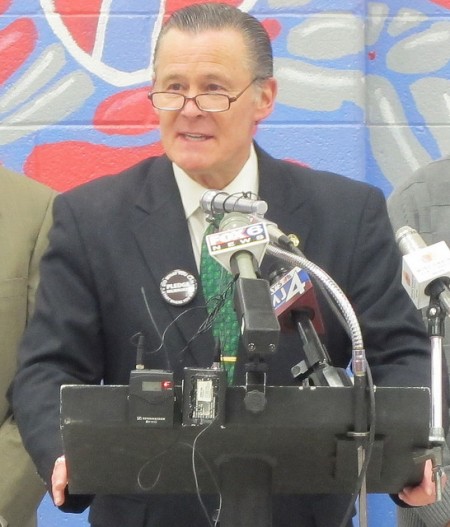Impact of City Reduction in Marijuana Fine?
Local leaders offer different views on new city ordinance lowering maximum fine for pot possession to just $50.

Ald. Bob Donovan (center), pictured at an unrelated event, voted against the new marijuana ordinance, saying it would have a negative impact on employment. Photo by Edgar Mendez.
The Milwaukee Common Council’s decision to lower the maximum fine for marijuana possession of less than 25 grams to $50 has drawn praise as a first step to reducing racial disparities in enforcement of marijuana laws, and criticism for its potential to increase marijuana use.
The change came on the heels of a Public Policy Forum report that found that 86 percent of those arrested for possession of marijuana in Milwaukee County were African American. A 2014 NNS report found that marijuana possession charges originating from Milwaukee were a strong contributor to the racial disparity in Wisconsin’s prison system.
The ordinance reduces the maximum fine from $500, though it doesn’t necessarily affect the district attorney’s ability to prosecute a second or subsequent offenses through state court. A second state conviction results in a felony. Nevertheless, Ald. Nik Kovac, who authored the new ordinance, said changing the local law is the first step toward changing the prosecution process that has disproportionately impacted African Americans in Milwaukee. During the Common Council meeting Kovac said the racial disparity in enforcement of marijuana laws, “intentional or not, is not acceptable.”
According to Kovac, lowering the punishment will deprioritize marijuana offenses, allowing police officers and district attorneys to focus more resources on violent criminals.
Molly Collins, associate director of the ACLU of Wisconsin, described the new ordinance as a small move towards racial justice in the state’s criminal justice system. She said the existing disparities are “embarrassing and morally wrong,” adding that the old policy has been ineffective. “Decades of harsh punishments through the criminal justice system have had no impact on use and create a lifetime of collateral damage.”

Molly Collins, associate director of the ACLU of Wisconsin, is working on legislation to decriminalize marijuana possession. (Photo by Edgar Mendez)
Collins said changes need to be made in policing, charging and incarceration to end the racial disparity related to marijuana possession.
While several steps remain before marijuana possession would no longer result in state charges, according to Collins the ordinance change will still result in fewer people being arrested. “There is no simple answer, no silver bullet, but it is critical we take a lot of steps in the right direction.”
Ald. Bob Donovan was one of three council members to vote against the measure. In a statement emailed to NNS, he said the change in the local law would result in more people using marijuana, which will hurt their employment opportunities.
“We already have a serious joblessness rate in Milwaukee and I believe now we will have many more people closing a door to employment opportunities because [applicants] can’t pass a drug test,” wrote Donovan. The most recent data available from the American Management Association found that 62 percent of employers require a drug test.
Donovan stated that the drug problem in the community is growing, and that the new ordinance is sending the wrong message. “I cannot, in good conscience, support something I feel will hurt society’s efforts to combat drug use,” he said. Torre Johnson, site manager for Wisconsin Community Services, also expressed concern about the ordinance’s impact on individuals who are looking for jobs.
“A lot of our young people already want to just get high and not get a job,” Johnson said. Still, he said slowing down the process of locking people up for minor drug offenses overshadows that concern.
Johnson described marijuana as a “gateway” drug and said he does worry that the change in the ordinance could lead to an epidemic in marijuana use among youth in Milwaukee. “I don’t want to see young people thinking it’s okay to get high all the time but I’m also tired of seeing our courts flooded with people of color.”
Justin Bielinski, who earlier this year announced his candidacy for 8th District alderman, the seat Donovan currently occupies, spent five years as a group therapy facilitator on the adolescent day treatment unit at Rogers Memorial Hospital in West Allis. He said that while many of the patients he dealt with used marijuana on a regular basis, they rarely, if ever, said that receiving a ticket or fine deterred them.
“In my opinion, a change in fine levels will have little to no impact on the (marijuana) usage levels of teenagers in Milwaukee.”
He said that moderate marijuana usage among youth is often less harmful than effects of binge drinking or other drugs.
This story was originally published by Milwaukee Neighborhood News Service, where you can find other stories reporting on fifteen city neighborhoods in Milwaukee.

















So youth in Milwaukee will now go “Hey they lowered the fine for marijuana possession I had no interest in smoking it before but now I am going to smoke some immediately?”
“..Johnson described marijuana as a “gateway” drug and said he does worry that the change in the ordinance could lead to an epidemic in marijuana use among youth in Milwaukee. “I don’t want to see young people thinking it’s okay to get high all the time but I’m also tired of seeing our courts flooded with people of color.”
I share similar concerns but have no idea how to solve it. Don’t want kids getting used to getting high and don’t want kids in the system either. Whatever happened to the DARE program?
Some would say that DARE was a failure.
“The GAO report found that “In brief, the six long-term evaluations of the DARE elementary school curriculum that we reviewed found no significant differences in illicit drug use between students who received DARE in the fifth or sixth grade (the intervention group) and students who did not (the control group).”
http://www.csdp.org/news/news/darerevised.htm
Bob Donovan continues to show how out of touch he is with people. Justin Belinski is clearly a polar opposite of Donovan and exactly what Milwaukee needs.
The war on weed has failed. We spend $30-50k a year to imprison each non-violent drug offender each year. This turns non-violent kids into hardened criminals. Imagine your own Billy getting locked up with rapists and murders; do you really think the outcome would help your child? We spend more money to lock up a pot dealer than we do on a child’s education. Decriminalization and then legalization is the only way Milwaukee can get out of this hole and look to a bright future.
Bob’s argument about jobs and drug tests is garbage. He is trying to use Drug Policy as worker regulation, which the free market already does and he quoted. I thought republicans were supposed to be against government regulations because the free market can take care of itself?
If your only argument is to protect kids, make harsher penalties for selling to a kid. Adults can drink and take prescribed drugs until they throw up and make an ass of themselves; why can’t they smoke until they go to sleep?
I guess I can agree with that. I was a DARE kid and smoked plenty of weed in middle and high school. But that was 20 years ago I would assume that some agency somewhere would’v found an effective and successful program.
This change is so short sighted. People are so concerned about people being punished for breaking the law that they fail to realize the much greater damage this change can do. Great… so now someone doing illicit drugs will save a couple hundred dollars… meanwhile we encourage more hard core crimes through supporting a black market of illegal drugs that create a world of violence and violent crime.
How many murders and acts of violence happen in this city due to the illegal drug trade? How much violence and damage is done on our borders because of drug cartels? People live in their own little world and focus on a few small problems without looking at how their actions affect things far greater than they want to admit.
People ALWAYS have the choice to not get involved in drugs… period. If you don’t want to risk your future employment opportunities, don’t do illicit drugs. If you fear racist cops targeting you, don’t do illicit drugs.
Making marijuana might be a valid discussion, but loosening the consequences like this is not the answer.
“How many murders and acts of violence happen in this city due to the illegal drug trade?”
At one time couldn’t you have substituted alcohol for drug in that sentence? What good did prohibition do? I wasn’t around then (maybe WCD can answer) but I don’t think it worked out too well. And I believe alcohol is far more dangerous than pot. I knew a lot people who consumed a lot of both, and the alcohol turned them into angry, violent monsters. The pot made them hungry and sleepy. You seem really worked up about this AG. That’s how I feel about booze (though yes I know booze is legal and pot is not; that makes no sense to me).
AG do feel that if marijuana is legalized and regulated nation wide that it will finally put an end to the horrible violence along the border?
If weed is legalized I’ve always wondered how can one be tested to see if they’ve been driving while stoned? I remember in HS we’d opt to smoke rather than drink because we felt we were less likely to get into trouble if we were pulled over.
PMD, as I stated, you can make a case for legalizing pot, but what they are doing here is not legalizing pot. They’re upping all the incentives to boost the drug trade while reducing the consequences for supporting it.
You know where I stand on alcohol and driving under the influence, so you can’t say I’m pro one and anti the other. But since pot IS illegal, it does support the gangs and the black market, and all the negatives that come with it. What Kovac and those who agree with him are doing here is not the solution.
Casey, I’m on the fence about legalizing marijuana and driving under the influence is one of the reasons why. But as I said to PMD, this isn’t a discussion about legalizing pot, this is encouraging people to support the illegal drug trade and softening the consequences of doing so. Supporters may see this as the same thing, or a step towards it, but it’s not.
I did not mean to imply you are pro one AG. Just for the record. Is there evidence to suggest that reducing fines for marijuana possession directly results in an increase in criminal activity? Has that been true in other cities?
According to these decriminalizing marijuana does not increase crime.
http://norml.org/component/zoo/category/rethinking-the-consequences-of-decriminalizing-marijuana
http://www.alternet.org/drugs/increased-access-cannabis-associated-reductions-violent-crimes
Colorado’s marijuana usage is up significantly since they eliminated criminal consequences for it’s use. I’d say that supports that position.
But regarding fines and crime in general, there are studies that support that, yes. I remember studies show that if you know you’re likely to get caught, the higher the fine the stronger it’s effect. I can’t find one in the short time I have right now regarding drugs, but I found one such study for speeding which I still think is relevant. http://www.hindawi.com/journals/jcrim/2014/827194/
Both of those studies revolve around the legalization of marijuana for recreational or medicinal use… which again, is not what is happening here.
The Denver Post says that marijuana use in Colorado was already increasing before the state legalized it. I think you’re being a little alarmist on this.
I think the alarmists are the ones who think current marijuana laws are a big cause of the lack of jobs in the inner city.
Here’s a story about California. In 2010 it did not legalize marijuana, but it reduced penalties for possession. Crime went down, not up. http://www.cjcj.org/news/5996?utm_source=%2ffiles%2fCA_Youth_Crime_2011.pdf&utm_medium=web&utm_campaign=redirect
Wow, amazing! Marijuana reforms, within only one year, reduced rapes and murders by teens by over 20%! It’s a miracle! Truly a rigorous study was done there. Lets implement this practice everywhere!
Did you even read that thing?
Glad we agree AG. Reducing fines does not suddenly cause an epidemic of violent crime. Now you can get back to telling the teenagers to pull up their pants and get off your lawn.
You’re so clever PMD, the way you pretend that something has been proven even if it hasn’t. I tip my hat you little devil.
I’ve been poking around, researching other cities that have reduced penalties for marijuana possession (not outright legalization), like St. Louis, and I’ve come across nothing that reports on any increase in crime. Also, there are a ton of stories reporting major crime decreases after legalization.
Also dozens of studies indicate that reducing the penalties for marijuana possession has not led to an increase in use of marijuana.
http://norml.org/aboutmarijuana/item/marijuana-decriminalization-its-impact-on-use-2
I just don’t see any reason to believe that reducing the penalties for marijuana possession will result in crime rates or marijuana use going up.
Here’s a much more recent study that shows decriminalization increases the liklihood of teenagers using and trying marijuana and decreases the negative view of pot within that group. (you may need a research database to read, but cited below)
Miech, R. A., Johnston, L., O’Malley, P.,M., Bachman, J. G., Schulenberg, J., & Patrick, M. E. (2015). Trends in use of marijuana and attitudes toward marijuana among youth before and after decriminalization: The case of california 2007-2013. The International Journal on Drug Policy, 26(4), 336.
Unfortunately, anything I look up quickly regarding crime shows that arrests and prosecuted crime drops inherently when you make it not a crime anymore. If we decriminalized murder we would see a drop in arrests for murder as well.
I guess we’ll have to disagree on this one AG and see what happens. Maybe someday one of us will be saying “I told you so.”